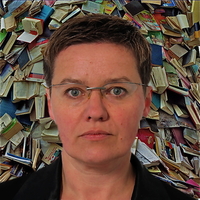ELECTIVE COURSE
CV
Studied South Slavic and Classical Philology at the University of Zagreb where she graduated in 1989 with the thesis Irony in the Dramaturgy of Antun Šoljan. She received her master’s degree from Yale University, and continued her postgraduate studies at the University of Vienna. She received her PhD in 2002 with the thesis Comparative Syntax of Personal Pronouns in South Slavic Languages.
Peti-Stantić is a full professor of South Slavic languages and comparative linguistics at the Faculty of Humanities and Social Sciences, University of Zagreb.
She spent time at the Center for Cognitive Research at Tufts University in the United States of America on two occasions, first as a Fulbright Scholar (The Relationship Between Scrambling and the Position of the Clitic Cluster in Slavic Languages) and later as a research associate, when she participated in a project on the hierarchy of grammatical structures with prof. Ray Jackendoff.
Research interests
In addition to the sociolinguistic topics she has studied for years, today her focus is on cognitive linguistics, especially the information structure, as well as shifts in the correlation of grammatical levels. In addition, she studies the linguistic status of patients with aphasia and grammars of hereditary speakers, and especially the relationship of hierarchy and linearity in language processing, specifically from the point of view of the relationship between the complexity of language structures and the complexity of tasks.
Teaching
Functions and membership
Chair of Slovenian Language and Literature at the Faculty of Humanities and Social Sciences, University of Zagreb.
Editorial work
She is one of the editors of a large multi-year project of the Encyclopedia of Slavic Languages and Linguistics, which started to be published in 2020 by the world-renowned publisher Brill Publishers.
As an editor, she founded and ran for many years the series Krijesnica at the Golden Marketing publishing house, and in 2007 she founded the Arboretum Electa series at the Algoritam publishing house, which she edited until 2015. She translated Meta Grosman’s book In Defense of Reading: The Reader and Literature in the 21st Century (Algorithm, 2010). During her stay at Tufts University, she collaborated with Maryanne Wolf and Stephanie Gottwald at the Center for Reading and Linguistic Research and specialized in the RAVE-O method.
Publications and projects
She publishes papers in domestic and international scientific publications. She gave talks at numerous scientific conferences across the world, and has given a number of invited lectures at European and American universities. Since 2006, she has been a PI of a research project titled Croatia and Closely Related Cultural and Linguistic Communities. In addition to scientific monographs on the history of standardization processes in South Slavic languages (Language Ours and/or Their: Exercises in Comparative History of South Slavic Standardization Processes, 2008) and contemporary sociolinguistics (Croatian Language Question Today: Identities and Ideologies, 2013; 2014, both with colleague Keith Langston), she is the author of the Big Slovenian-Croatian and Croatian-Slovenian Dictionary (2014) and a translator from Slovenian and English. She also wrote the manual Language Games for Small and Big, which is well known to many educators and teachers, with her colleague Vladimira Velički.
From 2015 to 2019, she was the leader of the working group within the COST action IS1401 European Literacy Network, within which researchers from 27 countries in five subgroups were engaged in research of the developmental aspects of reading literacy and reading competence. In this capacity, she held several plenary and invited lectures at international conferences. Since 2017, she has been the PI of Croatian Science Foundation project The Building Blocks of Croatian Mental Grammar: Constraints of Information Structure. Within the project, Peti-Stantić and her collaborators produced the Croatian Psycholinguistic Database available via the project website http://megahr.ffzg.unizg.hr/. In cooperation with advisors from the Education Agency, she organized a series of workshops on teaching vocabulary and text structures, which will continue in the future.
In 2019 she published a book Through Reading to Understanding: From Reading Literacy to Reading Competence. In this book, for the first time in Croatia, neurolinguistic and psycholinguistic perspectives are merged in a completely new way, establishing the discipline of reading science and connecting them with modern glottodidactic methods. Starting from reading as a complex activity that requires automation and concatenation of processes in the brain of each individual, the book emphasizes the importance of working on structuring the intellectual vocabulary of young people, as well as paying attention to text structures. At its end, the book provides numerous exercises that serve teachers in choosing strategies and shaping the teaching process.
Together with her daughter, a high school senior, Vedrana Stantić, she wrote a book entitled Curiosity: Why Should Young People Read Popular Science Texts, and do it Now? The book, published in March 2021, is structured through a series of chapters that ask questions such as: Why read, and why read popular science texts? Who and why can be a good writer of a popular science text? What interests high school students (and why)? The answers to the questions asked are given in the form of popular science text and conversations, with numerous examples of texts by domestic and foreign authors interpreted by both authors, each from their own point of view. Therefore, the book, in addition to being an invitation to read, can also serve as a kind of reader of popular science texts.
With Vedrana Stantić she also edited a book Journey into the Unknown: Why did I become a scientist (and how it came to be)? in which 31 Croatian scientists wrote their life stories and answered numerous questions about the meaning of science and scientific thinking. The book, published in August 2021, is organized in form of chapters/letters to young people.
Peti-Stantić translates from Slovenian and English into Croatian. In this capacity, she translated more than 40 books over past several years.
Full bibliography

